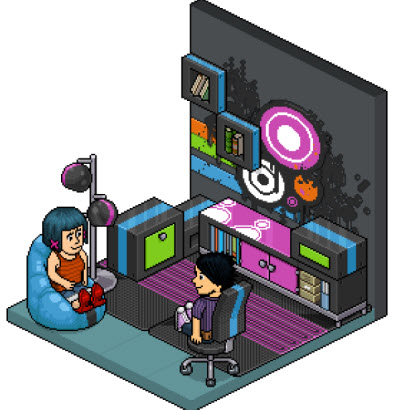GamesBeat: Does the trend look like it’ll completely come back, then?
LaFontaine: We think it’ll completely come back. We also plan on opening the Turkish market, so we think in short order we’ll be ahead of where we were before we had to mute the site.
GamesBeat: When you looked back, what did you find? Was there a way to improve it on any one of those levels?
LaFontaine: Sure. We went back and took, basically, an algorithmic approach. We keep all the chat logs for a period of time, so we can recreate what happened. We went back and found that 3.7 percent of the users in that period were engaging in inappropriate chat. When we did the unmute, which was pulling together the comments of the whole community, one thing that we saw was that there was more talk about avoiding that behavior than there was about the positive alternative. So we think that the inappropriateness was over-represented in terms of what people were talking about. We initiated what we called the Habbo Patrol. We called for volunteers from people who wanted to help police that site, engaging that upper layer of the community. We had 8 percent of the users volunteer to be on the Patrol. You look at the whole user base, about 3.7 percent are behaving inappropriately. Eight percent were passionate enough to help police that. Then the remainder were just neutral, using the service to interact with their friends and have fun. When we initiated the Patrol, added that layer, it immediately put the odds on the side of behavior being appropriate.
GamesBeat: Have you already been working on filtering out predators as well?
LaFontaine: Very actively. One area that I want to be really clear on is, we have a deep cooperation with law enforcement on that issue. We can’t talk about our individual cases, but we have contributed to convictions, and we have been the reporting agency in that area. We have a very strong stance on that. We’re very aggressive in terms of pursuing that kind of behavior…We want to set the record straight on that. We have an absolutely hard stance on that issue. We have a data-sharing agreement with law enforcement. We follow all the privacy procedures. We’ve mapped out every jurisdiction. We’re tied into the national child-safety task force. So we have an incredibly close and long-standing relationship with law enforcement on that issue.
GamesBeat: How many people are there now on the service?
LaFontaine: Right now it’s about 6 million a month. That breaks down to around 2 million a week. We use weekly actives because of the way teens’ lives are organized. They’re organized around the weekend. Catching them on the weekend is a big part of the service.
GamesBeat: What’s the hot thing they do now, what’s trending?
LaFontaine: They form groups and roleplay. The Habbo Patrol that I mentioned, it was a service to the community, but it’s also a chance to roleplay. Within the Patrol, they created ranks. They create a room…. What they do is they socially organize around status. There’s a very clear hierarchy of who’s been there the longest, who has the most badges, who is the expert at a certain thing, who wins contests. What they like to do is create really social groups. That’s the main activity. We have over 65 percent of the users involved in some active group. That group is a tribe or an identity around a certain activity.
GamesBeat: Have you ever broken out how many people deal with the safety part [of Habbo], then?
LaFontaine: We have 28 that are staff directly responsible for overseeing the day-to-day activity. We have a team of 16 that is a product team. They create new tools for us. And then we devote a significant proportion of our expense lines around moderation complements. People that moderate and use the tools to follow different activities. Easily a third of our cost base is around safety and moderation. I think that’s been consistent for the service throughout its life.
GamesBeat: It sounds like you have an increase, then, in the number of people who are willing to join the self-policing efforts.
LaFontaine: For sure. Habbo has had programs over the years that…they called it all sorts of different things. But they were largely manual because many of the social-networking tools that are very common today weren’t available. The idea of reputation management…you can earn reputation points, and that way, we give you more credibility as you become an internal guardian. That’s something there was less precedent for. Because Habbo started in the early days of this version of the Internet. Now, when we talk about a reputation-management system…there are several different models we’ve drawn from to create this skills base, and we can automate it. We can create a sustainable program around self-policing, the gamification of self-policing, because you achieve more levels the more you help. The more you monitor, the higher you go. We’re gamifying it in a way, which is part of what Habbo is all about.
GamesBeat: How long has that kind of gamifcation of the safety part been around?
LaFontaine: Well, for Habbo, I can only speak for our site…. When we reorganized in February, that’s when I put the full product team on the creation of this talent tree. The talent tree starts as a tour guide or a helper role, rather than a policing role. In order to build your reputation up, you want to show that you can reliably interact with other users. You can build up through that. We launched that in the end of May and had tremendous participation in that. All we’re doing now for the next phase is adding a level, the Guardian level, which allows you to take some limited police actions. It allows you to participate in the process of cleaning up the site. The infrastructure had already been built earlier this year. The other thing we did that we started earlier in the year is, we opened an API to the platforms, so third parties can build entertainment content, games, and so on for the platform. We’re launching, next week, our first third-party game. So what happens is, we increase the skill path for safety, and we put more games in the service. There’s more to do, more people watching what’s going on. It’s part of a plan we initiated back in February.



